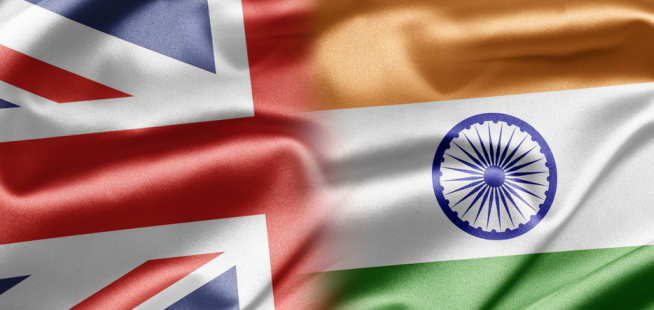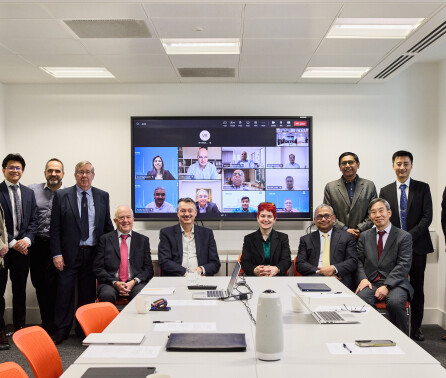South Asia
India

Imperial College London is proud of its strong and longstanding connections with India.
The College’s academics enjoy rich and diverse research collaborations with partners in India across a range of disciplines, having co-authored just over 1,600 research publications with partners at more than 300 Indian institutions since 2018.
Top research partners include the Indian Institute of Science Bangalore, the All India Institute of Medical Sciences, Christian Medical College, the Bhaba Atomic Research Centre and the prestigious Indian Institutes of Technology.
Partnerships are especially strong in the areas of health, climate and sustainability. In November 2022 Imperial and the George Institute for Global Health India established a £10M NIHR Global Health Research Centre on Non-Communicable Diseases and Environmental Change.
The College also enjoys a strong partnership with the Indian institute of Science, the ‘Imperial College London – Indian Institute of Science Partnership Fund’ is supporting a wealth of innovative collaborations ranging from using AI to monitor biodiversity to developing materials for quantum technologies.
In 2023, the College was honoured to host India’s Science Minister and Principal Scientific Advisor to celebrate connections with India and discuss how the College can be at the fore of strengthening the important UK-India knowledge partnership.
In 2007 an Indian supporters association, the Imperial College India Foundation was founded. The foundation exists to promote research collaborations between industry in India and the College and to increase the College profile in India.
Bangladesh
The Department of Civil Engineering and the Department of Epidemiology in the School of Medicine are working collaboratively with the University of Dhaka to research the impacts of water salinity on health in Bangladesh.
Imperial has co-authored over 120 publications with institutions in Bangladesh over the last 5 years.
The College currently has 28 Bangaldeshi students across all 4 faculties, 6 staff members and 170 contactable alumni.
Pakistan
The Nobel Prize winning Pakistani physicist Professor Abdus Salam was one of Imperial's most famous physicists. He was appointed Chair of Mathematical Physics at the College in 1957 and continued to have associations with the theoretical physics group until his death in 1996. Imperial's University Management Board has recently named the College's Central Library after Professor Salam, in his honour. It is now known as the Abdus Salam Library.
Imperial has co-authored over 270 publications with Pakistani institutions over the last 5 years.
The College currently has 67 Pakistani students across all 4 faculties, 13 staff members and 583 contactable alumni.
Nepal
Imperial's Professor Mike Templeton, in the Department of Civil and Environmental Engineering, was recently awarded a global outreach award from the Association of Environmental Engineering and Science Professors (AEESP). His work focuses on water and sanitation, mostly in developing countries, and their related public health challenges. Prof. Templeton was commended for his high-impact research, educational and outreach activities over the past 15 years, which have contributed to addressing a range of public health challenges, including minimising nitrate pollution from on-site santiation in Nepal.
Prof. Buytaert was awarded the 2022 Henry Darcy Medal of the European Geophysics Union. Some of his recent research includes the development of new sensors to support community-based floor early warning in Nepal. He has recently undertaken fieldwork in the upper Kaligandaki river basin, Nepal.
Students from Imperial’s BSc in Global Health presented their community placement experiences at a lively event at Imperial’s Invention Rooms. One student group worked with the Gurkha Centre – addressing health and welfare issues for the Gurkha Nepalese community in West London and beyond.
Imperial has co-authored almost 40 publications with Nepalese institutions over the last 5 years.
The College has 4 Nepalese students, 8 staff and 48 contactable alumni.
Sri Lanka
The Centre for Blast Injury Studies (CBIS) brings together medics, engineers, pain specialists, operational humanitarians and prosthetics and rehabilitation experts who are already driving new research and innovations to meet the clinical needs of children with blast injuries. A recent project looks to develop new methods for treating victims who have lost or injured limbs as a consequence of the conflict in Sri Lanka.
Imperial researchers have developed a low-cost, east-to-use manufacture stabiliser for broken bones to help where such devices are in short supply. It’s being tested in Sri Lanka.
5 Dyson School students have won the DESIRE award for their design futures project that aligns sustainability of the Amazon Rainforest with the needs of its inhabitants. They have now taken their experience to Sri Lanka, having delivered a Global Innovation Masterclass in September 2022 and working with the Sri Lankan private and non-governmental sectors.
The Department of Civil and Environmental Engineering has advised on the construction of the Southern Expressway.
Imperial has co-authored almost 160 publications with Sri Lankan Institutions over the last 5 years.
The College has 21 Sri Lankan students across all 4 faculties, 8 members of staff, and 319 contactable alumni.
News from South Asia
Read more news01 November 2023
Imperial launches its biggest ever scholarship programme for Indian…




